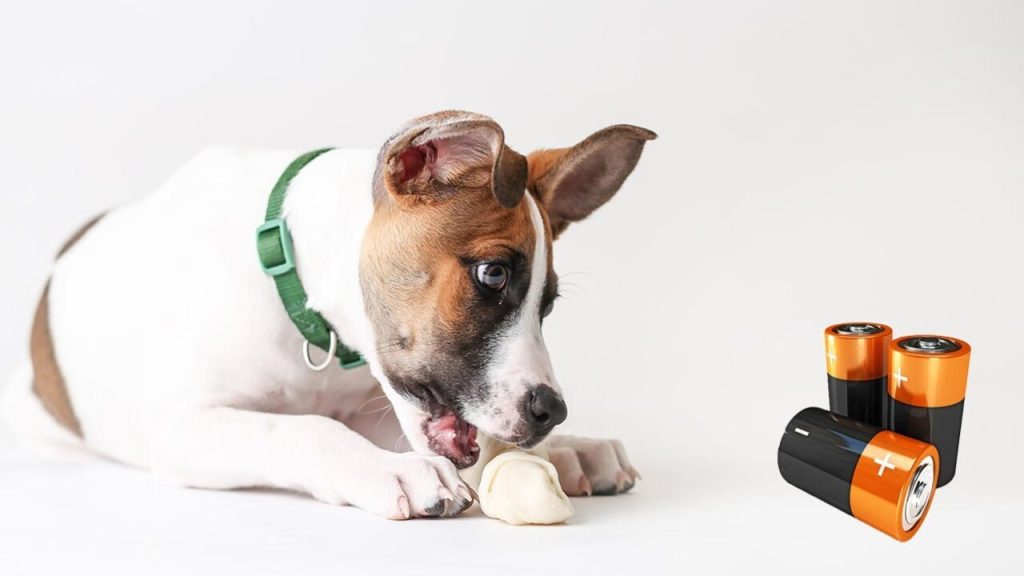Have you ever wondered what would happen if your dog eats a battery? Batteries contain hazardous materials that may be toxic to animals, and it’s important to be prepared for an emergency if this should occur.
It can be quite tempting for dogs of all sizes and types to chew on things that they shouldn’t, including batteries. If your four-legged friend gets their teeth around a battery, the consequences could be serious.
Not only do batteries contain corrosive liquids that can cause severe stomach irritation if ingested, but they are also made from heavy metals that may interfere with proper neurological functioning in some cases.
In this article, we will look at the potential dangers posed by the ingestion of batteries, including how to identify the symptoms of poisoning and how best to deal with the situation. We will then explore avenues for ensuring your pet’s health and safety in the future.
What to Do If Your Dog Eats a Battery?
If you suspect that your dog has eaten a battery, it is important to act quickly and take action to ensure their safety. The first step should be to remove the source of the battery from the dog’s reach. Then, if possible, inspect the battery for any signs of corrosion or leakage and note down any information about its size or type.
Next, contact your veterinarian and explain your concerns as quickly as possible; they will be able to provide advice on how best to proceed in order to ensure that your dog receives appropriate medical attention.
If the battery is still inside the dog, surgery may be necessary to remove it. This will enable your veterinarian to inspect and assess any potential damage that has been caused by the battery and prescribe treatment accordingly.
However, if the battery has already passed through the digestive system, then your veterinarian may suggest regular monitoring of your pet’s health until they are certain that they have recovered.
In any case, if you think that your dog has eaten a battery, it is important to seek professional medical advice as soon as possible.

Different Types of Battery Ingestion in Dogs
There are several different types of battery ingestion that can occur in dogs, and each type carries its own set of risks.
The most common type is “button cell” batteries, which are small cylindrical batteries often used in watches or hearing aids. These types of batteries can be particularly dangerous due to their size, as they can easily get stuck in the throat or digestive tract. If this were to happen, it could cause serious damage to the dog’s internal organs or even lead to poisoning.
Another type of battery that dogs may ingest is a “lithium-ion” battery. These are larger, flat batteries that are commonly found in electronics such as laptops or mobile phones. Ingesting these types of batteries can cause severe burns to the throat and stomach, as well as lead to vomiting and diarrhea.
Finally, there is the risk of “alkaline” batteries which are usually 9-volt or AAA-sized and used in items such as toys or flashlights. If a dog were to chew on an alkaline battery, it could release corrosive materials into its mouth and throat which could cause serious irritation and inflammation.
What makes batteries so dangerous to dogs?
Batteries are highly dangerous to dogs due to the materials they contain, which can cause serious injury or illness if ingested. Batteries typically consist of a metal housing containing an electrolyte solution and one or more electrodes.
The parts that make up a battery, such as the metal housing and electrodes, are made from heavy metals, including copper, lead, and mercury, which can be toxic to animals if ingested.
Additionally, the electrolyte solution is usually composed of acid or alkaline salts, both of which can cause severe stomach irritation when swallowed. As such, it is important for dog owners to ensure that their pet does not have access to any batteries.
Dogs and the Dangers of Batteries
It is essential that pet owners take all necessary precautions to protect their furry friends from the dangers posed by batteries. Dogs have a natural tendency to explore and chew on objects, and this behavior can put them at risk of serious injury or illness if they come into contact with a battery.
The materials contained in most batteries, such as heavy metals and corrosive liquids, can be highly toxic and cause severe stomach irritation if ingested. Additionally, batteries can contain sharp edges which may cause physical harm if chewed on by a dog.
To avoid any potential disasters, it is important for pet owners to keep all batteries out of the reach of their four-legged friends and to seek veterinary attention immediately if they suspect that their pet has eaten a battery.
Preventing Your Dog from Eating Batteries
It is essential for dog owners to take steps to prevent their pets from being exposed to and consuming batteries. Here are a few tips that can help you keep your four-legged friend safe:
• Keep all batteries out of reach of your pet at all times. Store them away in a secure cupboard or drawer, ideally one that cannot be opened by your dog.
• Check all items that could contain batteries before giving them to your pet as a toy. This includes remote controls, toys with sound effects, and children’s toys that may have small batteries inside.
• Monitor your pet when they are playing with toys or objects that may contain batteries. Be on the lookout for signs of tampering and inspect these items regularly for any damage.
• Dispose of used batteries responsibly and keep them away from your dog at all times.
Conclusion
In conclusion, batteries can be incredibly dangerous for dogs if ingested. It is essential for pet owners to ensure that their four-legged friends do not have access to any batteries and to seek veterinary attention immediately if they suspect their pet has eaten one.
By taking the necessary precautions to keep batteries out of reach and inspecting all items with potential battery dangers, pet owners can help keep their furry friends safe.


